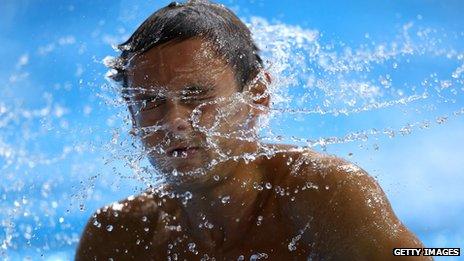The next generation of HD television
- Published

The London Olympics has just showcased the world's first live broadcast of the latest viewing technology - super hi vision, with pictures 16 times as sharp as HDTV and multi-channel surround-sound.
The BBC's media correspondent Torin Douglas considers its benefits and finds out what viewers think of it.
Ever since the first Olympic radio transmissions from Paris in 1924, broadcasters have used the Games to demonstrate the latest next-generation technology.
The 1948 London Games were the first to be televised in people's homes. The 1964 Games in Tokyo pioneered colour TV.
And in 1984 the Los Angeles Games were the first to be broadcast in High Definition, which eventually reached UK homes more than 20 years later.
Back in 1948, the BBC's head of television outside broadcasts showed viewers on-screen how it was done.
"Here at the Empire Pool are the cameras set up to watch the aquatic events and the boxing," he said.
"The cameras are extremely complicated and use miniature valves developed for radar and other secret purposes during the war."
Now, 64 years later, Olympic swimmers in London are again being televised using the latest technology.
Super hi vision, developed by the Japanese broadcaster NHK, provides ultra high definition pictures - 16 times as sharp as high definition images, which themselves are four times as clear as standard TV pictures.
The sound is much better too. HD surround-sound uses 5.1 channels and is very impressive. Super hi vision uses 22.2.
I joined 120 viewers who had booked to see the system's first live broadcast, on a special 300-inch, cinema-size screen at the BBC's Broadcasting House in London.
The morning's swimming heats from the Olympic Aquatic Centre were also transmitted to viewing theatres in the BBC's Pacific Quay headquarters in Glasgow, the National Media Museum in Bradford and venues in Tokyo, Fukushima and Washington DC.
'Testing bed'
Tim Plyming, who leads the BBC's Olympic trials of the system, says they are building on the history of innovation at the event.
"The scale of the Olympics is a great testing bed," he explains.
"Most of the big leaps in technology that we've known - from black and white to colour and from standard definition to high definition, and now to ultra high definition - have all had their home at the Olympic Games."
Plyming says the picture is so clear it is like looking through a glass wall into the stadium or aquatic centre. Other broadcasters claim it is a truly immersive experience that feels just like being there.
Some licence payers have questioned whether it is a good use of the BBC's budget.
"Spending money and resources on super hi vision just for prestige is a disgrace at a time when the BBC is cutting back," commented one on the BBC website.
But others disagreed. "If it wasn't for the visionaries in broadcasting and video technology we would still be watching 405 line black and white television," declared one correspondent.
'Amazing'
So what did my fellow viewers make of it? Quite simply, they were bowled over.
Torin Douglas reports from a super hi-vision screening in London
"The sound was fantastic and the picture was amazing, so clear" said one London woman.
"Amazing," agreed another: "You really do feel like you're in the stadium, in the atmosphere."
A French man told me he had been in the Aquatic Centre on Saturday and the comparison was very good. "You seem to be there," he said.
I agree. If you can't get a ticket, this experience really is the next best thing. And there are still a few tickets available - free of charge - between now and the end of the Olympics.
Screenings in London and Glasgow can be booked through the BBC ticketing website, while screenings in Bradford can be booked through the National Media Museum.
You can also watch some of the 1948 Olympic broadcasts and see one of the original cameras in an exhibition of Olympics TV technology at Broadcasting House.
But don't expect to find super hi vision on the high street soon. HD took more than 20 years to progress from the Los Angeles Olympics into UK homes, and the latest next-generation technology will not be available domestically for some years.
And apart from the likely cost, who has room for a 300-inch screen?
- Published17 July 2012
- Published29 September 2010